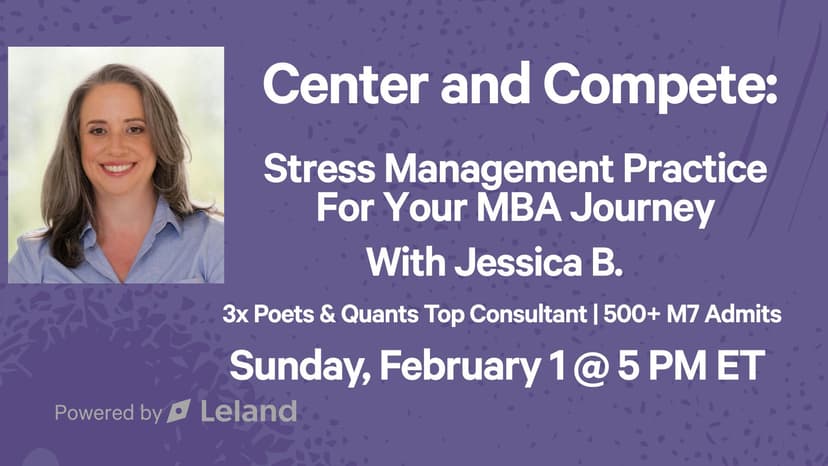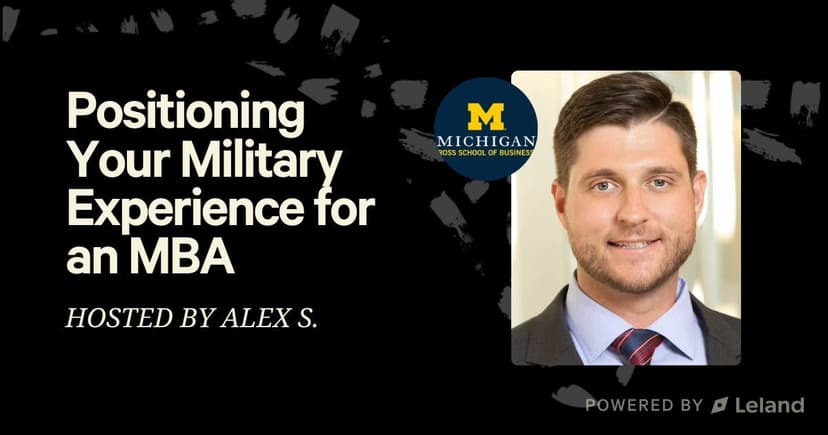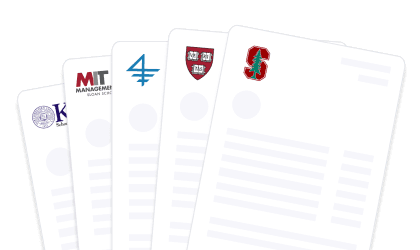
Join a free event
Learn from top coaches and industry experts in live, interactive sessions you can join for free.
Table of Contents
Applying to a Master of Business Administration (MBA) program can feel overwhelming, especially when trying to decipher what admissions committees truly value. While most MBA programs list standard requirements, top business schools often seek candidates who bring more to the table. This guide breaks down the essential MBA admission requirements and offers insights into what top programs really look for.
What Are the Basic Requirements for an MBA Program?
Whether you're a career switcher, a future entrepreneur, or climbing the corporate ladder, most MBA degree programs ask for the same foundational materials in your application. But don’t mistake “standard” for “simple.” Each requirement is a chance to showcase who you are, what you've done, and why you're ready for business school.
Here’s a breakdown of the typical MBA admission requirements — and how to approach them strategically.
1. Bachelor’s Degree (Any Major)
You’ll need a four-year undergraduate degree from an accredited college or university. It doesn’t need to be in business administration — in fact, most MBA degree programs actively seek prospective MBA students from diverse academic backgrounds, including liberal arts, engineering, and social sciences. Your major matters less than your academic rigor, intellectual curiosity, and ability to succeed in a fast-paced graduate program.
Expert Tip: If you have a non-quantitative background, consider taking additional coursework in subjects like statistics, finance, or economics to show readiness.
2. Undergraduate GPA
While most schools don’t publish a hard minimum, a cumulative GPA of 3.0 or above is considered competitive. Still, the admissions committee will look at more than just the number, including the difficulty of your undergraduate courses, trends over time (did your grades improve?), and the college or university you attended.
If your GPA is on the lower side, strong test scores, a sharp resume, or an optional essay explaining extenuating circumstances can help balance your profile.
3. Standardized Test Scores (GMAT, GRE, EA — or Waiver)
Most MBA programs require standardized test scores from the GMAT, Graduate Record Exam (GRE), or the Executive Assessment (EA) — especially for full-time MBA programs. Some programs, like online MBA programs, offer test waivers if you meet certain criteria, like significant work experience or a previous graduate degree.
- Be sure to send official test scores directly through the appropriate school code.
- Confirm each program’s policies on test format, score reports, and valid test dates.
Some programs accept unofficial transcripts and score screenshots initially, but you’ll need to provide official transcripts and verified scores later in the application process.
4. Professional Work Experience
Top MBA programs typically expect 2 to 5 years of full-time, post-undergraduate work experience by the time you matriculate. But here’s the key: it’s not a numbers game. Admissions officers care far more about what you’ve done with that time than how long you’ve been in the workforce.
That means they’re looking for:
- Career progression - Have you taken on more responsibility over time? Been promoted or tapped for high-impact projects?
- Leadership experience - Whether formal or informal, have you led teams, mentored others, launched initiatives, or made decisions that shaped outcomes?
- Results and impact - Can you point to tangible contributions — revenue driven, processes improved, markets entered, people influenced?
It's totally okay if your path isn’t traditional. Startups, nonprofits, family businesses, or military service all count. The question is: what did you learn, and how did you grow?
For international applicants, a global perspective is a strength. If you’ve worked across markets, collaborated with international teams, or studied abroad, highlight how those experiences shaped your worldview — and how they’ll enrich the classroom for others.
5. Resume
Your resume should act as a snapshot of your career story, tailored specifically for the MBA application process. Focus on achievements, leadership, and quantifiable impact. Use active language and highlight promotions, cross-functional projects, and any business-related fields you’ve worked in.
For expert tips on writing your resume, read through our guide and download the free MBA resume examples found in our articles How to Craft the Perfect MBA Resume–With Examples and What Are MBA Adcoms Looking for in Resumes.
6. Letters of Recommendation
Most programs require two letters of recommendation, typically from current or former supervisors. These recommendations should speak to your analytical skills, collaboration, initiative, and readiness for graduate study.
Some schools also ask your recommenders to complete a recommendation form or answer specific behavioral questions.
Read our recommendation guide: How to Get the Perfect MBA Recommendation Letter–With Examples
7. MBA Application Essays
Your essays are the heart of your application. They’re where you’ll articulate your career goals, explain why an MBA is the right next step, and show how each business school aligns with your story. Admissions committees value clarity, authenticity, and reflection, not just ambition.
- Many schools offer an optional essay where you can explain weaknesses, application status changes, or other extenuating circumstances.
- Some programs may also require a video essay or prompt-based short answers.
Use these opportunities to demonstrate self-awareness and strong communication skills — key traits for any future leader.
If you’re looking for top-of-the-line advice on how to write a jaw-dropping essay, read our comprehensive MBA essay guides, full of important information such as timelines, application dates, example essays for each school, and more: How to Write a Powerful MBA Essay and The Ultimate M7 MBA Essay Guide
8. Interview (If Invited)
If your application makes it past the initial review, you’ll likely be invited to interview. This is a pivotal moment — it’s your chance to bring your application to life, demonstrate your fit, and build a human connection with the admissions committee or current students conducting the interview.
You might be asked about your career goals, why you're interested in that particular MBA program, and how you’d contribute to the community.
For more expert tips and tricks to rocking your MBA interview, take a look through Leland’s articles:
Additional Requirements for International Applicants
If you're an international student, you'll likely need to submit:
- English proficiency test scores (e.g., TOEFL or IELTS)
- Credential evaluations to confirm your four-year bachelor’s degree equivalency
- Additional documents like a passport scan, visa information, or proof of financial resources
Be sure to check the school’s specific requirements for international applicants, some differ in their application form, deadlines, or transcript policies.
What Top MBA Programs Really Look For
Okay, so you’ve got the basics covered — the degree, the test scores, the resume. But what really moves the needle at top MBA programs? Here’s what the admissions committee is actually scanning for when they read your application.
Leadership That Feels Real
You don’t need to have “manager” in your title. Schools are looking for signs that you’ve stepped up, taken initiative, and made things happen — whether you led a team, launched something new, or just pushed a tough project across the finish line. They care less about your title and more about the story: What did you do? Why did it matter? What changed because of you?
Clear, Thoughtful Career Goals
Vague goals are one of the fastest ways to lose an adcom’s interest. They want to see that you’ve done the thinking: Where are you headed? Why is an MBA the right next step — and why now? This doesn’t mean having every detail mapped out, but you should have a direction and a reason that actually makes sense.
A Career That’s Going Somewhere
Progression matters. Even if your path hasn’t been linear, they want to see that you’ve been growing — taking on more responsibility, making a bigger impact, stretching your skillset. If you’ve had a few zigs and zags, that’s okay. Just make sure you own the story behind them.
You Actually Know the Program
Here’s a secret: “Why our school?” is often a make-or-break question. If your answer could apply to any top 10 MBA, it’s not strong enough. You should be able to talk about the specific classes, clubs, values, and people that genuinely excite you. Show that you’ve done your homework — and that you’re not just applying because it’s a “top program.”
Self-Awareness (More Than Just Buzzwords)
Top schools want to admit people who know who they are, not just what they’ve done. Are you able to reflect on your wins and your failures? Can you explain what motivates you? Do your essays feel like they were written by a human who’s actually thought about their journey? That kind of self-awareness is what helps your story stick.
Read: How to Choose an MBA Program: The Discerning Student's Guide
Optional or Additional Materials
Video Essays
These are most common at schools like Kellogg, Yale SOM, and INSEAD, and they’re exactly what they sound like: short, timed video responses to behavioral or personal questions. Think of them as a casual, low-stakes extension of your interview. The admissions committee isn’t looking for a perfect performance — they’re evaluating your communication skills, presence, and how you think on your feet.
Pro tip: Practice a few times on video before you submit. And don’t script everything — authenticity matters more than polish.
Optional Essays
This is your space to explain things that might raise questions: a lower undergraduate GPA, a gap in employment, a career switch, or anything else that needs context. It’s not a place to repeat content from your personal statement. The best optional essays are concise, direct, and focused on ownership + resolution — not excuses.
For example: “I struggled academically in my sophomore year due to a family illness. Since then, I’ve maintained a 3.7 GPA and taken two MBA-level accounting courses to demonstrate academic readiness.”
Diversity or Additional Statements
Some programs invite (or encourage) additional essays where you can speak to your identity, background, or unique perspective, particularly if it has shaped how you lead, collaborate, or approach challenges. This isn’t just for underrepresented applicants; it’s a chance to help the admissions committee see what you’ll bring to the classroom and community.
Columbia and Berkeley Haas, for example, include prompts that ask about inclusion, belonging, and values-driven leadership.
Deferred MBA Programs
If you're still in college or recently graduated (typically within 0–1 years of work experience), deferred MBA programs let you apply early and enroll later. You get admitted now, then work for 2–5 years before starting your MBA program.
These are great for students who know they want an MBA and want to “lock in” a future seat. Top deferred options include:
- Harvard 2+2 Program
- Stanford GSB Deferred Enrollment
- Wharton Advance Access
- Chicago Booth Scholars Program
- MIT Sloan Early Admission
- Yale SOM Silver Scholars (unique in starting the MBA right after undergrad)
Most deferred programs have specific application deadlines (usually in spring), and they evaluate candidates based on academic strength, leadership potential, and career clarity — even if you don’t have much formal experience yet.
MBA Requirements: Competitive vs. Minimum Stats
Average GMAT, GRE, and GPA at Top MBA Programs
| Business School | Average GMAT | Average GPA |
|---|---|---|
| Harvard Business School | 740 | 3.73 |
| Stanford GSB | 738 | 3.77 |
| Wharton (UPenn) | 728 | 3.60 |
| Chicago Booth | 730 | 3.60 |
| Kellogg (Northwestern) | 731 | 3.70 |
| Columbia Business School | 730 | 3.50 |
| MIT Sloan | 730 | 3.61 |
Read: M7 MBA Programs – What They Are & How to Get In
Top 25 MBA Programs (Select):
| Business School | Average GMAT | Average GPA |
|---|---|---|
| Yale School of Management | 730 | 3.64 |
| Dartmouth Tuck | 726 | 3.49 |
| Michigan Ross | 719 | 3.43 |
| UCLA Anderson | 710 | 3.50 |
| NYU Stern | 732 | 3.61 |
| Duke Fuqua | 670–760 (range) | 3.10–3.89 (range) |
| Cornell Johnson | 710 | 3.35 |
| Carnegie Mellon Tepper | 705 | 3.40 |
Read: The Top 25 MBA Programs—Acceptance Rates, Tuition, and More
Competitive vs. Minimum Stats
Top MBA programs evaluate applications holistically, but there’s still a meaningful difference between what’s required and what’s competitive.
| Metric | Minimum (Typical) | Competitive (Top Programs) |
|---|---|---|
| GMAT Score | 600–650 | 710–740+ |
| GRE (Verbal + Quant Total) | 300–310 | 320–330+ |
| Undergraduate GPA | 3.0 (sometimes lower) | 3.5–3.7+ |
| Years of Work Experience | 2 years (bare minimum) | 3–6 years with leadership growth |
Read: MBA Acceptance Rates, GPA, & Test Scores of the Top 25 B-Schools
What If Your Test Score or GPA Is Below Average?
A lower test score or GPA can feel like a red flag, but it doesn’t have to be a dealbreaker. Top MBA programs care just as much about your trajectory, self-awareness, and potential as they do about numbers. Plenty of admits to HBS, Wharton, and other top schools have been admitted with “below average” stats.
The key is showing the admissions committee: Here’s why my numbers don’t define me, and here’s everything else I bring to the table.
Here’s how to make a below-average metric just one piece of a much stronger story:
- Offset with strength elsewhere. If your GPA is lower than average, aim to crush the GMAT or GRE — it’s one of the most effective ways to show academic readiness. If your test score isn’t stellar, lean harder into career impact, leadership, and your upward trajectory.
- Take a quant class (seriously). If your GPA is low and your test score is average, take a course like MBA Math, HBS CORe, or a community college stats or finance class. This shows initiative and gives the admissions committee a fresh datapoint on your academic ability.
- Use the optional essay wisely. This isn’t the place for excuses — it’s where you give honest context. Maybe your grades dipped due to a personal issue, or you didn’t realize the importance of GPA until later. Own it, show what you’ve learned, and move on.
- Get recommenders who’ll vouch hard for you. Strong letters can tip the scales. Choose recommenders who’ve seen your leadership, analytical skills, or ability to grow under pressure, especially if they can contrast it with your academic record in a meaningful way.
- Show growth, always. Whether it’s through career progression, post-college learning, or simply self-reflection in your essays, prove that you’re not the same person you were at 19 — and that you’re absolutely ready for a graduate-level business program now.
Are You Ready to Apply?
Applying to an MBA program isn’t just about submitting a few documents — it’s about making a strategic, well-timed move for your career. If you’re wondering whether now is the right time (or if you’re even ready), here’s how to think it through.
Timeline of When to Start
You’ll want to start preparing at least 9–12 months before your target deadlines. That gives you enough time to research programs, study for the GMAT/GRE, line up recommenders, and craft strong essays without rushing.
Here’s a detailed MBA application timeline table, broken down month-by-month for candidates aiming to apply in Round 1 (September/October).
| Month | What to Focus On |
|---|---|
| October (Year Before) | Reflect on your career goals and long-term vision. Decide whether an MBA is the right next step. |
| November | Begin researching programs — curriculum, culture, location, recruiting strengths, etc. |
| December | Create a shortlist of target schools. Start GMAT/GRE prep if you haven’t already. |
| January | Continue test prep. Schedule your first test attempt for early spring if possible. |
| February | Take GMAT/GRE or complete a diagnostic and intensify prep. Reach out to potential recommenders. |
| March | Visit campuses (if possible), attend info sessions, and connect with alumni. Narrow your school list. |
| April | Finalize your test scores or retake as needed. Begin drafting your resume. |
| May | Start outlining essays — focus on your story, goals, and why each program fits. |
| June | Work on your essays and continue refining your resume. Reconfirm recommenders and provide context. |
| July | Finalize and polish essay drafts. Begin working inside application portals. |
| August | Submit applications for Round 1 deadlines (usually mid-Sept to early Oct). Schedule interview prep. |
| September | Submit final applications. Prepare for potential interviews. |
| October | Interview season begins. Send thank-you notes and continue prep. |
For more insights, read: The MBA Application Timeline—With Chart
What to Do Before You Apply
Before you dive into applications, take a step back and get clear on a few things:
- Your goals - What do you want out of an MBA? Do you have a rough sense of where you're headed post-grad? You don’t need a 10-year plan, but direction matters.
- Your story - Can you explain why now is the right time for business school, and what makes your background uniquely valuable to an MBA classroom?
- Your fit - Start researching schools not just for rankings, but for culture, values, teaching style, and career support. Talk to alumni, attend info sessions, and explore beyond the websites.
And logistically? Make sure you’ve got time carved out to study for standardized tests, polish your resume, and draft (and re-draft) your essays.
Deferred MBA & Future Planning
If you’re still in college or within a year of graduating, you might not be applying to start your MBA right now, but that doesn’t mean you can’t lock it in early. Deferred MBA programs like HBS 2+2, Wharton Advanced Access, and Stanford GSB’s deferred track let you apply now, get accepted, and then work for a few years before enrolling.
Even if you’re not eligible for deferred admission, planning ahead is still smart. Maybe you want to wait until you’ve hit a certain level at work or completed a project that could strengthen your resume. That’s totally valid. Many applicants spend a year or two getting “application-ready” before hitting submit.
TL;DR: You don’t have to apply this year to make progress this year.
Work With a Coach to Assess Your MBA Readiness
You don’t have to figure this out alone. The MBA application process is high-stakes, time-consuming, and often way more confusing than it needs to be. That’s where a coach comes in, not to do the work for you, but to help you make smarter, more strategic moves.
A great coach will help you see your blind spots, sharpen your story, and make sure your application reflects your unique strengths, not just what you think admissions wants to hear. They’ll challenge you on your goals, help you decide where to apply (and why), and keep you accountable when life and work get busy.
Match with an expert MBA coach who can help you assess where you stand and how to get where you want to go.
FAQs: MBA Requirements
Can I apply to an MBA program if I already have an MBA or another graduate degree?
- Yes, many programs, including top schools like Wharton, accept applicants who already hold an MBA or another graduate degree. However, it's essential to clearly articulate your reasons for pursuing a second MBA and how it aligns with your career goals.
Do three-year bachelor's degrees from international institutions meet MBA admission requirements?
- Many U.S. MBA programs accept three-year bachelor's degrees from international institutions, provided they are equivalent to a U.S. four-year degree. For example, Wharton considers applicants with three-year degrees eligible if the degree is equivalent. It's advisable to check specific program requirements or consult with the admissions office.
Is there a minimum GMAT or GRE score required to apply?
- Most top MBA programs do not have a strict minimum GMAT or GRE score requirement. Admissions committees take a holistic approach, considering various aspects of your application. However, competitive applicants often have scores that align with the program's average.
What types of work experience are considered valuable for MBA admissions?
- Admissions committees value diverse professional experiences. While traditional business roles are common, experiences in non-profits, military service, or entrepreneurial ventures are also appreciated. The key is to demonstrate leadership, impact, and growth in your roles.
Are there prerequisites or required coursework before starting an MBA program?
- While most MBA programs do not have formal prerequisites, a foundational understanding of quantitative subjects like statistics, accounting, and economics is beneficial. Some schools offer pre-MBA courses or boot camps to help students prepare. For instance, Vanderbilt offers a "Quant Camp" for incoming students to review essential quantitative skills.
Browse hundreds of expert coaches
Leland coaches have helped thousands of people achieve their goals. A dedicated mentor can make all the difference.



























